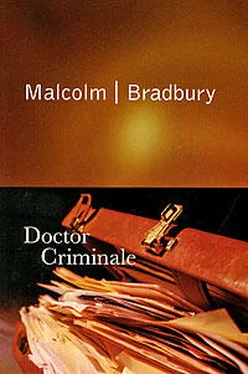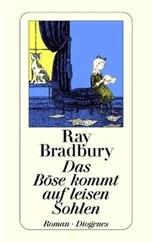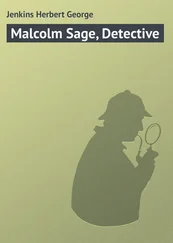Malcolm Bradbury - Doctor Criminale
Здесь есть возможность читать онлайн «Malcolm Bradbury - Doctor Criminale» весь текст электронной книги совершенно бесплатно (целиком полную версию без сокращений). В некоторых случаях можно слушать аудио, скачать через торрент в формате fb2 и присутствует краткое содержание. Город: London, Год выпуска: 2000, ISBN: 2000, Издательство: Picador, Жанр: Современная проза, на английском языке. Описание произведения, (предисловие) а так же отзывы посетителей доступны на портале библиотеки ЛибКат.
- Название:Doctor Criminale
- Автор:
- Издательство:Picador
- Жанр:
- Год:2000
- Город:London
- ISBN:978-0330390347
- Рейтинг книги:5 / 5. Голосов: 1
-
Избранное:Добавить в избранное
- Отзывы:
-
Ваша оценка:
- 100
- 1
- 2
- 3
- 4
- 5
Doctor Criminale: краткое содержание, описание и аннотация
Предлагаем к чтению аннотацию, описание, краткое содержание или предисловие (зависит от того, что написал сам автор книги «Doctor Criminale»). Если вы не нашли необходимую информацию о книге — напишите в комментариях, мы постараемся отыскать её.
Doctor Criminale — читать онлайн бесплатно полную книгу (весь текст) целиком
Ниже представлен текст книги, разбитый по страницам. Система сохранения места последней прочитанной страницы, позволяет с удобством читать онлайн бесплатно книгу «Doctor Criminale», без необходимости каждый раз заново искать на чём Вы остановились. Поставьте закладку, и сможете в любой момент перейти на страницу, на которой закончили чтение.
Интервал:
Закладка:
So the theatre-goers among you will doubtless know his great historical drama The Women Behind Martin Luther , which is generally compared with Brecht, and not generally to Brecht’s advantage. And what serious reader hasn’t read, and probably wept a tear or two over, Homeless: A Tale of the Modem Age , that small but perfect novella that Graham Greene once named as the finest single work of the second half of the twentieth century? Biography-buffs will know his great three-volume life of Johann Wolfgang von Goethe ( Goethe: The German Shakespeare? ), which not only restores to us the indivisible wholeness of the man but proves beyond doubt that the German Reich could never have existed for a minute without him. Others will remember his extraordinary work of economic theory, Is Money Necessary ?, which had so much impact in Soviet Russia, and his summative study The Psycho-Pathology of the Postmodern Masses , favourite reading of social psychologists and police chiefs everywhere. Add to that those vast illustrated tomes on Graeco-Roman civilization so weighty they must have cracked in two the Manhattan coffee tables they were doubtless intended for, and the small paperback works on Marxist philosophy whose tattered covers once filled the bookstore windows in Leningrad and Moscow and were awarded as swimming prizes at Communist summer schools worldwide, and you already have a polymath. Criminale didn’t simply write in every literary form; he seemed to appeal to every political culture.
All this I expect you know very well. But, believe me, this is only the beginning of the man called Bazlo Criminale. Oh, you may have sat in the stalls and enjoyed the epic spectacle of The Women Behind Luther , or wept on your couch or your poolside recliner over the sweet perfection of Homeless . But have you read – and when I say read, I mean really read – his remarkable critique of phenomenology? His startling and courageous refutation of Marx’s techno-centrism? His audacious challenge to Nietzsche on modernity? His classic dispute with Adorno about the interpretation of history? The bitter quarrel with Heidegger over irony (which Criminale had much more of, and won)? You haven’t? Well, I have. For Criminale was not simply a writer. Unlike most writers, he thought as well.
In fact he had simply to catch sight of a German philosopher and he was in there after the jugular, only to glimpse a key modern idea and he was gnawing it like a bone. ‘The Philosopher King’ was the title of one of the articles (from an American magazine) I read in the pile that Ros brought home; it described him as the only true philosopher left in a post-philosophical culture, the man who has singlehandedly reinvigorated philosophy by writing its epitaph. Clearly no late modern idea was really an idea, no contemporary ideology pulling its weight as an ideology, until Criminale had tried it, put it through the fine grinder of his mind, tested it to destruction, given it – or withheld – his imprimatur. You could say, indeed, that by the beginning of the Eighties Criminale had already become to modern thought pretty much what Napoleon was to brandy. Nobody would have taken the stuff so seriously had not someone so obviously important and prestigious taken such an interest.
In short, as I came to discover, in those taut and tiring days after the Booker, Criminale was a true Modern Master. In fact if you want to find out more about him, as I did, you only need turn to the small volume on him (by Roger Scruton) in the ‘Modern Masters’ series, edited by Frank Kermode, published by Fontana Books. Here he appears in the list between Chomsky and Derrida – a fate, to be fair, not of his own choosing, but simply deriving from the random lottery of the alphabet. In what the blurb aptly defines as ‘a truly exhilarating examination of Criminale’s work’, Scruton warmly compares him with Marx and Nietzsche, Lukacs and Rosa Luxemburg, Gorky and Adam Smith (of course Scruton compares everyone with Adam Smith), and sees him as the modern Goethe. Not every single one of these comparisons goes in Criminale’s favour, but there is one that does. The others were all dead. While Criminale was alive, and well, and living in . . . well, where on earth was Criminale living? Probably not on earth at all, but in some jumbo jet overflying the Pacific. For Criminale wasn’t just famous, he was also that new phenomenon: the intellectual as frequent flyer, more airmiles to his credit than Dan Quayle. And the truth is, as I soon found out, researching and re-researching our one-hour feature for the series ‘Great Thinkers of the Age of Glasnost’, trying to keep up with a truly all-round man is truly all-round work. Of Criminale there seemed to be simply no end.
One day Ros’s big friend Lavinia showed up. Big she was indeed – big across the shoulders, monumental everywhere else, dressed like a sofa, but ten times more aggressive. I realized that some stormy dispute had blown up between Ros and her partner, and that what’s more I was its subject. Lavinia, it seemed, had serious doubts about whether someone like myself, untrained and unwashed in the field of television production, should have been entrusted with a key project on which the future of Nada Productions depended. The word ‘toyboy’ was used, I well remember, several times, both in my presence (‘So this is the toyboy, is it, darling?’) and then on the other side of a half-open door I happened to sit down quite close to.
‘But he’s brilliant, really,’ I heard Ros declare several times. ‘In bed maybe, darling,’ said Lavinia, ‘But really, Ros. All he does is sit on his pretty little butt all day and read things. That’s not how you research a major programme. Perhaps you’re tiring the poor sod out.’ ‘No, Lav, he jogs every lunchtime, he can take it,’ I heard Ros say, not with perfect truthfulness. ‘Okay, you’re giving him the treatment,’ Lavinia said, ‘Fine, but what I’d like to know is, when is he going to give us the treatment?’ ‘He’s made lots of notes,’ said Ros. ‘Darling, if it was notes I was after I’d have commissioned Andrew Lloyd Webber,’ said Lavinia, ‘I have to have a real treatment. Something I can go to Eldorado with and raise oodles of money, right? Sex is sex but cash is better. Where the hell is he?’
Then suddenly the door flew open, hefted by Lavinia’s vast shoulders, and she was all over me. ‘Okay, you, Francis,’ she said, ‘Just explain to me what’s happening. You’ve been working on this eight days and as far as I know you’ve come up with nothing.’ ‘I thought there was plenty,’ I said, ‘The refutation of Adorno, the quarrel with Heidegger —’ ‘Heidegger Schmeidegger,’ said Lavinia, looking at me with pity, ‘Darling, 1 you’re not writing your doctoral dissertation or an article for TLS . You’re researching a TV programme. We don’t want to know what the old bugger thinks. If there’s thinking in the programme he can sit there and do it himself. I want a plot, a life, a person. Tell me how he looks, who his friends are, who he screws, where he drinks, why he matters. Find me where he is.’ That’s not easy,’ I said, ‘He lives up in the air on jumbo jets most of the time. Just now he seems to be holed up somewhere, writing another book.’ ‘God, not another book,’ said Lavinia, ‘Come over here, darling. Sit on the sofa by me. Now listen, I’d like you to forget the philosophical conundrums. I don’t want to hear any more about the symbolism of feet in Homeless . I want a living, breathing, fallible human being, just like you and me, Francis, only more so. Capeesh ?’
I looked at her. ‘But Bazlo Criminale is a Modern Master, Lavinia,’ I said. ‘Right, darling,’ said Lavinia, ‘And I expect if you turn over a Modern Master, you’ll probably find a Modern Mistress. Honey, I want life and loves. I want friends and enemies. I want flesh and bones. I want peaks and troughs, failures and successes. I want locations, cities, houses, churches, parks. I want some people we can get our teeth into. I don’t want quarrels with Schmeidegger on being and non-being. I know he wrote a lot, darling. That doesn’t mean you have to. Just give me ten pages: life, loves, family, sex, money, politics. You have two more days, and then I’ll personally come and gut you. Find something we can use on television. It’s a fleshy human medium, with great stories. Is that my taxi? Terrific, all right, bye-bye darlings.’ ‘That bitch,’ said Ros, as we watched Lavinia climbing heavily into the taxi in the little street outside, ‘She’s jealous, of course. Did you like her?’ ‘Well, not entirely,’ I admitted. ‘Oh, brilliant,’ said Ros, ‘She always pulls stunts like this to take my men away from me.’ ‘The problem is, what am I supposed to do next?’ I asked. ‘Come upstairs and I’ll show you,’ said Ros. ‘No, I mean about Criminale,’ I said. ‘Do what Lavinia says,’ said Ros, ‘Everyone does what Lavinia says. Write ten simple pages. Break him down into segments.’ ‘Give him the treatment?’ ‘Yes,’ said Ros, ‘Come on.’
Читать дальшеИнтервал:
Закладка:
Похожие книги на «Doctor Criminale»
Представляем Вашему вниманию похожие книги на «Doctor Criminale» списком для выбора. Мы отобрали схожую по названию и смыслу литературу в надежде предоставить читателям больше вариантов отыскать новые, интересные, ещё непрочитанные произведения.
Обсуждение, отзывы о книге «Doctor Criminale» и просто собственные мнения читателей. Оставьте ваши комментарии, напишите, что Вы думаете о произведении, его смысле или главных героях. Укажите что конкретно понравилось, а что нет, и почему Вы так считаете.











